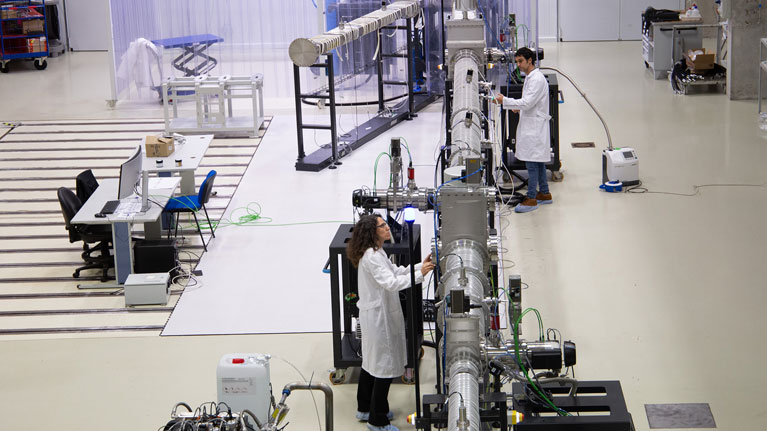Tekniker reports a record-breaking turnover of 32 million Euros thanks to R&D and technology transfers
In 2023, 50% of the technology centre’s revenues originated from contracts signed with more than 200 companies in sectors such as aeronautics, hydrogen or health.

Compared to 2022, the turnover reported by the Tekniker technology centre, member of the Basque Research and Technology Alliance (BRTA), began in 2023 with a growth of 18% and a record-breaking figure of 31,942,975 million Euros thanks to R&D actions and direct transfers of cutting-edge technology to the industrial fabric.
Forty-nine percent of the company’s revenues originated from contracts signed with more than 200 companies in sectors related to aeronautics, health or hydrogen supported by research actions and the implementation of high-added value solutions in a transition leading to an industrial sector that is to become smarter and more sustainable.
The Tekniker technology centre has dealt with this challenge by incorporating new materials, processes, resources and systems to implement a model that is competitive, sustainable and geared towards the circular economy. The organisation is currently collaborating with other companies to offer solutions connected to automation and robotics, sensors and actuators. It is also designing surfaces and materials, improving mechanical components and tribological systems, developing mechatronic systems and, finally, digitising production processes and industrial metrology.
Half of the technology centre’s revenues originated from its involvement in leading R+D+I projects related to competitive programmes sponsored by the Basque Government (24.5%), the Spanish Government (5.4%) and the European Union (17,1%).
A strategic approach
In 2023, and within the scope of the 2021-2024 strategic plan, Tekniker focused much more on areas such as aeronautics that accounted for 23% of projects related to industrial activities. Collaborative actions with leading companies were essential with regard to boosting the electrification of airplanes, developing new materials or deploying new production resources to perform on-site quality controls and develop new manufacturing tools such as laser or additive technologies.
As the technology centre specialises in different stages of the hydrogen value chain (from generation to application) it is nowadays a key partner with regard to addressing energy transition requirements that industrial firms and leading European authorities must meet.
Last year, Tekniker invested 5% of its revenues originating from the health sector on collaborative actions carried out with hospitals, start-ups, companies developing medical devices and their suppliers.
Although the technology centre has an extensive certified management system, special mention must be made of ISO 13485 that applies to the design and development of medical devices. This certification allows users to work with miniaturised hardware and software, optimised applications and robotic rehabilitation technologies to enable natural interactions between equipment, humans and digital solutions so that patient data management actions can be improved.
In 2023, Tekniker participated in 193 industrial projects and 53 actions sponsored by public authorities. This intense research activity delivered 5 new patents and brought about the establishment of a new European start-up focused on tribology called i-Tribomat.
Two key elements: commitment and talent
Tekniker, an organisation that is focused on multi-disciplinarity and technical excellence, is deeply committed to its highly qualified professionals that form part of a talented workforce that transfers knowledge to help create a world that is better and more friendly.
By the end of 2023, the centre had a workforce of 279 people. Thirty-three trainees carried out their end-of-degree projects in the different technological units in line with Tekniker’s ultimate goal with regard to cooperating with education and transferring talent.
More than 80% of the staff hold a university degree and 24% a PhD; an absolutely fundamental requirement to achieve a high degree of scientific excellence and specialisation to maintain and foster a stable and enduring relationship with universities and reference centres.
Special mention must be made of the efforts made with regard to safety & health in the area of environmental management as optimum results were reported in terms of management indicators. It was last year when Tekniker renewed its 14001 and 45001 certifications and, subsequent to calculating its carbon footprint, the organisation was awarded the official MITECO seal covering the years 2019-2020-2021-2022.
As a result of the organisation’s commitment in terms of reducing emissions, Tekniker carried out several critical actions such as installing photovoltaic panels on the roof to achieve a 7% reduction of external power consumption. It has also updated its mobility plan to further develop sustainable transport practices.
The technology centre invested nearly 2 million Euros last year to upgrade in-house facilities and equipment. A new specific space for the production of printed electronics was set up with the support of the Provincial Council of Gipuzkoa; thanks to the aid provided by the Basque Government’s Department for Economic Development, a laboratory was commissioned to develop and characterise coatings designed to resist high temperature corrosion.
Since adhering to the UN Global Compact Pact in 2014, Tekniker intensified its involvement in this global initiative in 2023 to set up a strong and sustainable model. As proof of its proactive approach, the organisation periodically reports its actions in terms of corporate social responsibility as stipulated by the Global Compact guidelines. All 10 principles and 17 SDGs are fully covered by the centre’s 2021-2024 Strategic Plan focused on implementing actions and setting the organisation’s key targets.
Finally, the technology centre is fully committed to its local environment via donations and collaborative actions carried out with local organisations whose purpose is to achieve higher levels of development, assist people with functional diversity and promote health, education and sustainability.
